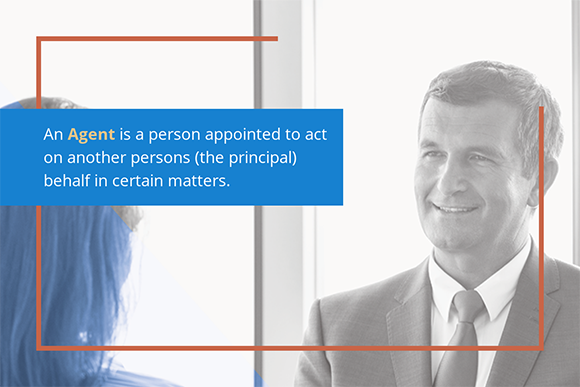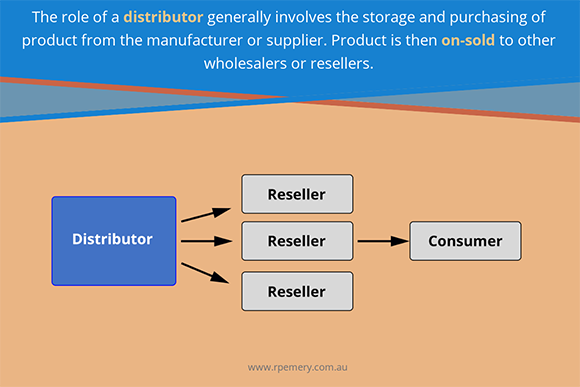Sales are the lifeblood of any business – without sales, your income stops and the viability of your business is compromised. But not every business owner is a born salesperson so sometimes you need help to get your product to market.
There are a few different ways to enlist the help of others to get your products in front of more prospects and increase your market share.
You can hire a:
Let’s look at each role separately.
Learn: Agreements for the Supply Chain
An agent is a person appointed to act on another persons (the principal) behalf.

This may be, for example, to promote and sell products manufactured by the principal, and enter into contracts for the sale of the goods at certain agreed prices and terms.
It is common for Sales Agents to be granted power to enter into sales contracts for the provision of certain goods or services on behalf of the principal. These contractual arrangements have the effect of binding the principal, so it’s not the agent who is liable for the delivery of the product or service (except in certain instances), but the principal. The principal is in effect the contracting party who is able to sue and be sued on the contract.
The agent’s power to act on behalf of the principal is strictly limited to the powers granted and set out in the terms and conditions of the Agency Agreement.
As you can see there is a great level of trust placed upon the Agent to act honestly and professionally while representing the principal, along with an obligation to act in the best interests of the Principal at all times.
Learn: When to use an Agency Agreement?
An exclusive agent is one who has “exclusive” rights to market your product. You can limit the Exclusive Agency by geographic location, for example, territory or postcode/s, or by time. That is, you may specify in the Agency Agreement that the agency is Exclusive for a fixed period (e.g. 1 year) and after the period has elapsed, the agreement becomes non-exclusive.
A Non-Exclusive Agent is someone who has the right to sell or market goods, but they are not the only agent. For the supplier, it means that you can appoint more than one sales agent and commission is only payable to the agent who finds a buyer.
An agency agreement is a tool (or document) to help determine essential terms and conditions before entering into an agency relationship.
No it doesn’t. However it is wise to have a written agreement so that both parties understand their rights and obligations. Human memory is very malleable and unreliable, so defining clear and concise written terms at the start will save you a heap of heartache down the track if things get messy.
Generally speaking, you may want to consider the following issues before drafting your agreement.
Learn: What should I include in a Sales Agency Agreement?
If you have plenty of time on your hands, you can start from scratch or see a lawyer.
Alternatively, our Sales Agency Agreement is the ideal starting point providing a sound framework for your document (which is what your lawyer will do!). A well-drafted Sales Agency template will include all the necessary clauses to protect your interests and will save you considerable time and money.
 Use our Sales Agency Agreement whenever you hire a ‘Sales agent’ to find customers for the products or services of a ‘principal’ party. The Sales agent is appointed to facilitate or negotiate a transaction on behalf of the principal in return for a commission.
Use our Sales Agency Agreement whenever you hire a ‘Sales agent’ to find customers for the products or services of a ‘principal’ party. The Sales agent is appointed to facilitate or negotiate a transaction on behalf of the principal in return for a commission.
This package includes an exclusive agency agreement and a non-exclusive agency agreement.
An Agency Agreement can be terminated by:
Your agreement will set down the terms for termination, which is another good reason to use a written agreement.
The role of a distributor (sometimes referred to as a wholesaler) generally involves the storage and purchasing of product from the manufacturer or supplier. Product is then on-sold to other wholesalers, resellers or an end user.

Distributors often provide after-sales services such as warranty servicing and repairs, as well as bearing responsibility for the marketing or branding of the product. Distributors often need to reach and maintain certain sales targets to maintain their distributor status.
It’s not unusual for distributors to sell directly to the end user. However, they may consider whether selling directly to the end user conflicts with the arrangements they have with their reseller network.
The relationship between the distributor and the manufacturer/supplier is often one of exclusivity, meaning the manufacturer or supplier will not be able to authorise any other organisation to sell the products within a specific territory or industry. Consequently, retailers and or resellers operating within the region can only source the product from the distributor.
A non-exclusive distributor is one of many distributors who have the same rights to on sell the products. They do not have a specific area, and they may find themselves competing with each other for business.
The Distribution agreement documents the terms and conditions reached between the parties. It also sets out the distribution rights that are granted, and defines the obligations.
No, it doesn’t, you can work on a handshake if you are comfortable doing so. However, it is wise to have a written agreement so that both parties understand their rights and obligations and you minimise the possibility for misunderstandings. Human memory is very malleable and unreliable, so defining clear and concise written terms at the start of the relationship will save you a heap of heartache down the track if things get messy.
For example – what will you do if the distributor does not pay for the goods you have supplied? What will you do if the distributor uses your IP in ways that tarnish your reputation? Without setting out the terms you may find yourself caught up in conflict which takes you away from productive work in your business.
In theory, you can draft your own agreement although most business owners will go straight to a lawyer who may charge thousand for a bespoke document.
Alternatively, our Distribution Agreement Template is the ideal starting point because it gives you a sound framework for your document, (your lawyer will start with a template just like it!). A well-drafted Distribution Agreement Template will include all the necessary clauses to protect your interests and will save you considerable time and money.
 Our Distribution Agreement is used when a manufacturer or supplier of a product wishes to develop a distribution network. The Distribution agreement documents the agreement reached between the parties where the distribution rights granted are either non-exclusive or on an exclusive basis within a specific geographical area.
Our Distribution Agreement is used when a manufacturer or supplier of a product wishes to develop a distribution network. The Distribution agreement documents the agreement reached between the parties where the distribution rights granted are either non-exclusive or on an exclusive basis within a specific geographical area.
Learn: How to cover all bases when preparing a Distributor Agreement
Unlike an Agent, a Distributor does not act on behalf of the product supplier in its dealings with purchasers or any other capacity (unless specified in an agreement). The supplier may make representations to its distributor that it will warrant and support its products, but it generally does not grant the Distributor rights to bind it contractually or act as its agent.
A Sales Agent rarely holds stock of the supplier, apart from stock it may need for demonstration purposes. The agent is not generally responsible for after sales support or warranty of the product, that will fall to the principal supplier or its distributor. A sales agent has certain powers to act on behalf of and bind the Principal.
Learn: What’s the difference between and Agent and a Distributor?
A Reseller is a party that finds buyers for your product, either at a wholesale level or to the end-user / consumer. Resellers usually have an obligation to hold stock of the product.
Resellers generally purchase stock from the manufacturer either directly or through a distribution network at a ‘wholesale’ rate. Resellers are then free to on-sell the product to the consumer using an end user recommended retail price as a guide.
A Reseller is essentially a middle-man who creates value by leveraging sales channels, promoting the product to its customers and providing product support when needed.
The reseller will often work alongside many other resellers promoting the brand or products of the manufacturer. If you consider some major retail names such as David Jones, Aldi, Dan Murphy’s or Bunnings, they are all resellers of significant brand products operating in the Australian retail market.
Learn: Distributors and Resellers, choosing the best fit for your business
A Reseller Agreement sets out the rights and obligations of one party the supplier of goods and the other the seller or retailer of the goods. It is a binding agreement used to govern the sale, marketing and product support within a retail network. A comprehensive reseller agreement will minimise misunderstandings, protect you from potential liability claims and provide a road map for dispute resolution.
 Our Reseller Agreement is used when a product supplier is looking to develop a retail network. The reseller may be a wholesaler, or a retailer who ultimately sells the product to the end user.
Our Reseller Agreement is used when a product supplier is looking to develop a retail network. The reseller may be a wholesaler, or a retailer who ultimately sells the product to the end user.
Under the terms set out in the agreement the Reseller accepts the appointment as a non-exclusive reseller, to market and promote the sale of the Products it purchases from Supplier. Under no circumstances is the reseller to act or purport to be an agent of the supplier.
A solid Reseller agreement can protect your business by defining the relationship with your distribution network and shielding you from potential liability.
A Referrer is an individual or business who tells people about your business and sens customers to you in exchange for a fee or other benefit.
A referral agreement is a legally binding document that allows you to set down the rules of a paid or mutually beneficial referral arrangement, so that both the Referrer and Referee are clear about their respective obligations.
 Whether you are providing leads by referring clients to a favoured business or you rely on introductions from others, a referral fee agreement will define how much is paid for the lead and under what circumstances.
Whether you are providing leads by referring clients to a favoured business or you rely on introductions from others, a referral fee agreement will define how much is paid for the lead and under what circumstances.
Learn: How to draft an effective Referral Services Agreement
Learn: Handling Referrer Arrangements
 Participants in and attendees of sporting, leisure and entertainment type events are often at risk of injury. Use an indemnity and release form to shield the organisers of such events from all from all responsibility or potential liability as a result of attendance at or participation in the event.
Participants in and attendees of sporting, leisure and entertainment type events are often at risk of injury. Use an indemnity and release form to shield the organisers of such events from all from all responsibility or potential liability as a result of attendance at or participation in the event.
 There’s no doubt that using referrals to grow your business can significantly boost your brand and income. By creating and maintaining strong referral networks, you’ll gain an invaluable source of advertising that just keeps on giving! Due caution needs to be taken, though, and you should never assume that your referral partner knows the ‘steps to the dance’ and has the same quality performance standards as you do.
There’s no doubt that using referrals to grow your business can significantly boost your brand and income. By creating and maintaining strong referral networks, you’ll gain an invaluable source of advertising that just keeps on giving! Due caution needs to be taken, though, and you should never assume that your referral partner knows the ‘steps to the dance’ and has the same quality performance standards as you do.